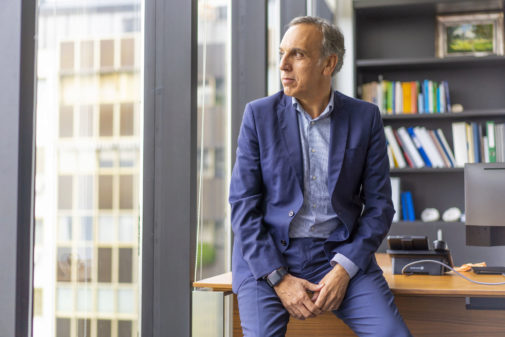Manuel Hurtado Marjalizo. Écija, 1962. Engineer, director of SaintGobain and writer of best sellers . The last one, The cemetery of the suicides (The Sphere of the Books) is a history of occultism in the hangover of 98.
Is an engineer, an executive who is moderately read, noticed at work? For good, it certainly shows. And it is an advantage because, among other things, affinities are created through culture that can be useful. But there are also many great managers who have no interest, who have not read a book in 20 years. It strikes me a lot, but I suppose we are all exposed to this world of leisure and screens. Do you take any professional game to be a writer? Culture helps you to be a better manager. If you have culture, if you know about History, for example, you are better informed, you can make better decisions. Tell me your story with literature. Was it an old vocation or was it an adult discovery? It was a discovery. I'm an engineer, I work in a multinational, it had nothing to do with letters. As a young man I composed some music, I liked art ... but I accidentally discovered the novel, writing a little on instinct, I found a novel that was a finalist for the Fernando Lara Award. Now, I dedicate every minute I have free. When do you write? I don't have a discipline, I write for pure pleasure. I write when I can, on weekends, on vacation ... Is it relatively easy to write? If you intend to tell something, do you usually do well? Writing is easy and pleasant. Therefore, more and more books are written. The bad thing is when you want someone to read you. And would you know what it is to write well? I do not have a definition. I know that I write with the idea of causing pleasure in the reader. I think I have to respect him, I have to think about the 12 hours he has been struggling with his work, with his family ... So you have to make him enjoy, take care of the language for him, avoid the very long scenes, find the number of Characters just don't overwhelm him. And then there is a work almost as a sculptor: sculpt, polish, perfect ... Would you write novels of infinite pages? I wrote one of 736 and in the editorial they already told me that it is valid, but that it was a bit long. It had not occurred to me that it was an inconvenience for the reader, but I still have a lot to learn.What do you like about 'The cemetery of the suicides'? I think it is the most rounded plot I have written: the two Stories are powerful and they get better. This trick is used by Leonardo Padura. I have not invented anything. The two planes work well because it creates hunger for reading. The reader is oxygenated. Does a novel begin to write with the story very planned? All I know is where the characters are, at what time and place. In this case, in Madrid, in the last years of the 19th century and an adventure in the Atlantic in the 17th century. What I do have is much studied read and much read. For this book I went back to Galdós. I remember Galdós as a bit of a hard reading. I didn't like it. It was from those obligatory readings that one saw with antipathy. But he is an outstanding chronicler. THE LAST QUESTION: I was once in the English cemetery in Madrid, but that of the suicides I have not gone. It has its charm, like all ancient cemeteries. It is full of graves of Jews, of atheists. Madrid also has its stages and its magical stories waiting for someone to tell them, as Ruiz Zafón did in Barcelona.According to the criteria of The Trust Project
Know more- Final Interview
- culture
- literature
National Narrative Prize. The Government rebukes writer Cristina Morales: "Nobody wants to see their country on fire"
The final interviewJoana Bonet, journalist: "T-shirt and memes feminism is inconsistent"
A VILLANO IN MADRID Peter Handke in Linares

